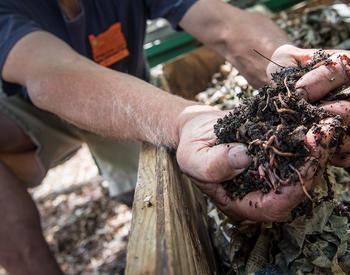Is Mushroom Compost Good For Vegetable Gardens
CORVALLIS - Commercial mushroom growers in the Willamette Valley grow tons of mushrooms in an elaborate mixture that gardeners love - mushroom compost.
Often sold at landscape supply houses, mushroom compost can help amend garden soil, but should be used with caution, according to John Hart, soil scientist with the Oregon State University Extension Service. Mushroom compost is rich in soluble salts and other nutrients and can kill germinating seeds and harm salt-sensitive plants including rhododendrons and azaleas.
The recipe for mushroom compost varies from company to company, but can include composted wheat or rye straw, peat moss, used horse bedding straw, chicken manure, cottonseed or canola meal, grape crushings from wineries, soybean meal, potash, gypsum, urea, ammonium nitrate and lime. The compost ingredients are weighed out, then mixed in.
At the PictSweet mushroom farm in Salem, huge piles of mushroom compost sit for about 30 days and do what compost does - heat up. The straw provides the structure and some food for bacteria, and the urea, cottonseed meal and chicken manure provide most of the nutrients.
The bacteria multiply, forcing the temperature inside the pile up to more than 160 degrees, killing any weed seeds or pathogens that might have been present in the straw or animal wastes. The result is mushroom compost, ready to grow a crop of commercial table mushrooms.
The cured compost is placed in beds in a dark, cool and humid warehouse and then is pasteurized at about 140 degrees to kill any surface disease-causing organisms and pests. Workers then inoculate the compost with mushroom spawn, or mycelium. Underground roots called mycelium grow in the compost, then five weeks after inoculation, mushrooms are ready to pick. A crop continues to be harvested for three to four weeks before the bed is exhausted.
After every planting cycle, the compost is removed because it is "used up," by the growing mushrooms. But it still has plenty left for gardeners and landscapers - it is sold to nurseries, landscape supply firms and general contractors all over the state.
Mushroom compost can supply nutrients and increase the water-holding capacity of the soil. But mushroom compost can be too much of a good thing for seeds, seedlings and young plants, said OSU's Hart.
"The soluble salts and other nutrients in fresh, undiluted mushroom compost are too concentrated for germinating seeds, young plants and other salt-sensitive plants including members of the heath family such as rhododendrons, blueberries and azaleas," said Hart.
To avoid killing germinating seeds and stressing heath family members, Hart recommends mixing mushroom compost with garden soil before using it on young plants. Or, order a supply of mushroom compost in the fall and let it sit uncovered, to "cure" over the winter.
Used with care, mushroom compost also can be used as a mulch around perennials, trees and shrubs, said Hart. For flower beds and vegetable gardens, till about three inches of the compost into the top six inches of fairly dry garden soil. For containerized plants, fresh mushroom compost should only make up about one-quarter of the volume of soil in the container. Remember that rhododendrons, azaleas, camellias and other members of the heath family may be injured by salts unless mushroom compost is "cured" first.
When ordering or buying mushroom compost, remember that one cubic yard of compost will cover about 100 square feet of garden to a depth of about two inches.

Want to learn more about this topic? Explore more resources from OSU Extension: Garden Soil and Compost
Is Mushroom Compost Good For Vegetable Gardens
Source: https://extension.oregonstate.edu/news/what-mushroom-compost
Posted by: rooneyadefees.blogspot.com

0 Response to "Is Mushroom Compost Good For Vegetable Gardens"
Post a Comment